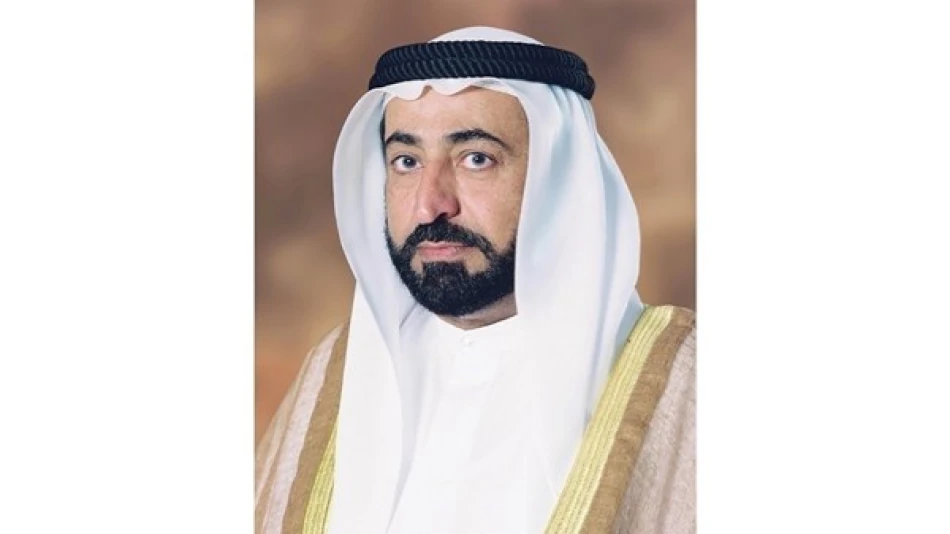
Sharjah Ruler Establishes New Child Safety Institution, Enhancing Emirates' Commitment to Child Welfare
Sharjah Establishes Dedicated Child Safety Institution to Combat Violence and Abuse
The Emirate of Sharjah has created a comprehensive child protection institution that signals the UAE's growing commitment to addressing child welfare through specialized, multi-disciplinary approaches. The new Child Safety Foundation, led by Sheikha Jawaher bint Mohammed Al Qasimi, will operate a dedicated center providing integrated legal, psychological, and medical services for child victims of violence and abuse—positioning Sharjah as a regional leader in child protection standards.
A Holistic Approach to Child Protection
The institution represents a significant shift from fragmented child welfare services to a centralized model. Under the new decree issued by Sheikh Dr. Sultan bin Mohammed Al Qasimi, Ruler of Sharjah, the foundation will operate the "Kanaf Child House" center, which consolidates forensic medical examinations, legal support, and psychological services under one roof.
This integrated approach mirrors successful models in countries like Norway and the United States, where Child Advocacy Centers have proven more effective than traditional systems that shuttle vulnerable children between multiple agencies and locations.
Strategic Positioning and Regional Leadership
The foundation's mandate explicitly aims to "enhance the emirate's position as a leading destination in child protection" through coordination with specialized authorities. This positioning reflects broader competition among Gulf states to establish themselves as centers of excellence in social development—similar to how Dubai and Abu Dhabi have competed in financial services and cultural initiatives.
The institution's focus on international partnerships and hosting global child protection experts suggests Sharjah is building toward becoming a regional hub for child welfare expertise, potentially attracting international organizations and funding.
Operational Framework and Innovation
Multi-Disciplinary Team Approach
The foundation will train and enable multi-disciplinary teams through continuous education, ensuring specialized trauma recovery services for children and families. This evidence-based approach acknowledges that child abuse cases require coordinated expertise from social workers, medical professionals, law enforcement, and legal advocates working simultaneously rather than sequentially.
Technology and Administrative Infrastructure
The decree emphasizes providing "administratively and technically equipped work environments" for child victims, suggesting significant investment in specialized facilities and potentially innovative technologies for child-friendly interviews and evidence collection.
Financial Structure and Sustainability
The foundation's diversified funding model includes government allocations, self-generated revenues, investment returns, and approved sponsorships. This structure provides operational flexibility while maintaining oversight through presidential approval requirements for resource utilization.
The emphasis on self-generated revenues indicates expectations that the institution will develop fee-for-service capabilities, potentially offering training programs or consulting services to other jurisdictions—creating a sustainable model beyond government funding.
Broader Implications for Child Welfare
Legal and Policy Development
The foundation's authority to recommend legislation and regulations related to child protection practices positions it as more than a service provider—it becomes a policy influencer that could shape UAE federal child protection standards.
This legislative advisory role suggests the institution may drive harmonization of child protection laws across the seven emirates, potentially creating more consistent standards and procedures nationwide.
International Standards and Best Practices
By mandating adherence to "global best practices" and hosting international experts, the foundation signals alignment with international child protection frameworks, including UN Convention on the Rights of the Child standards.
This international orientation may facilitate cooperation with global child protection organizations and potentially position the UAE for leadership roles in international child welfare initiatives, enhancing the country's soft power credentials.
Implementation Challenges and Success Factors
The success of this initiative will largely depend on effective coordination between existing government agencies, courts, and healthcare systems. The foundation's placement under the Sharjah Family and Community Council provides institutional backing, but operational success requires breaking down traditional bureaucratic silos.
The institution's ability to attract and retain specialized professionals in child psychology, forensic medicine, and social work will be crucial, particularly in a competitive regional job market where such expertise commands premium compensation.
Most critically, the foundation's impact will be measured not just by the services it provides, but by its ability to prevent future cases through community education and systemic reforms—transforming Sharjah's approach to child welfare from reactive to preventive.
Most Viewed News

 Layla Al Mansoori
Layla Al Mansoori






